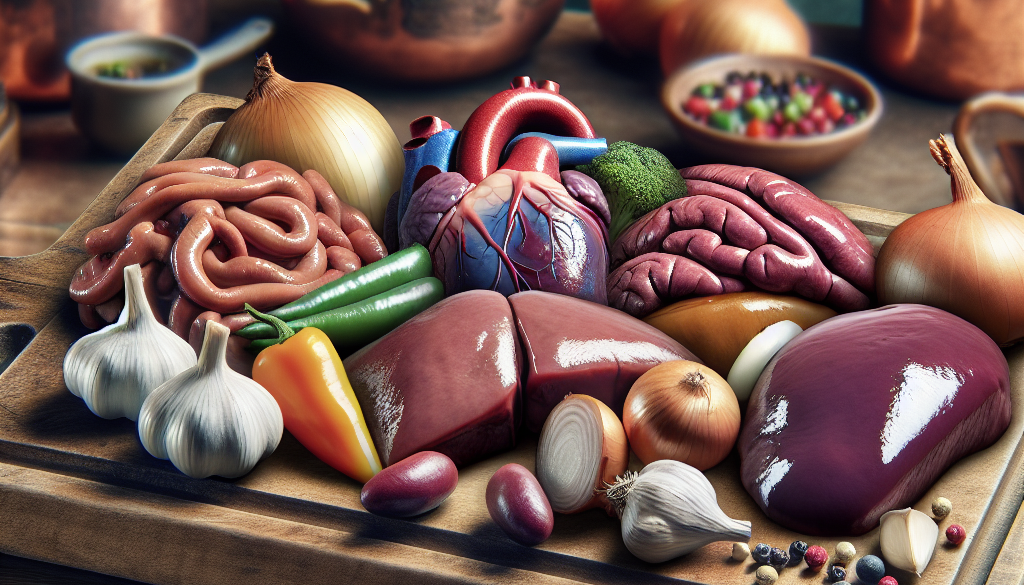Observing Possibilities around Organ Food
-
Table of Contents
- Exploring the Future of Organ Foods: A Nutritional Revolution
- The Nutritional Powerhouse of Organ Meats
- Sustainability and Ethical Considerations
- Overcoming the ‘Yuck’ Factor
- Regulatory and Health Challenges
- Market Potential and Consumer Acceptance
- Conclusion: Embracing Organ Foods for a Healthier Future
- Discover ETprotein’s High-Quality Protein Products
Exploring the Future of Organ Foods: A Nutritional Revolution

The concept of organ foods, or edible products derived from the organs of animals, is not new. However, with the increasing demand for sustainable and nutritious food sources, the potential for organ foods is being reexamined. This article delves into the possibilities surrounding organ foods, examining their nutritional benefits, sustainability, and the challenges they face in gaining widespread acceptance.
The Nutritional Powerhouse of Organ Meats
Organ meats, often referred to as offal, are the internal organs of animals consumed as food. Despite their somewhat controversial reputation in modern Western diets, they are packed with essential nutrients. Here are some of the key benefits:
- Rich in Vitamins and Minerals: Organs like liver and kidneys are high in vitamins A, B, D, E, and K, as well as minerals such as iron, zinc, and selenium.
- High-Quality Protein: Organ meats provide complete proteins with all the essential amino acids necessary for body function.
- Coenzyme Q10 (CoQ10): This antioxidant, particularly abundant in heart and liver, is crucial for energy production and heart health.
According to the USDA, a single serving of beef liver can provide over 600% of the daily recommended intake of vitamin A and more than 7 times the recommended amount of vitamin B12.
Sustainability and Ethical Considerations
As the global population grows, so does the demand for protein-rich foods. Organ meats offer a sustainable solution by utilizing parts of the animal that are often discarded. This nose-to-tail approach not only reduces waste but also respects the animal by ensuring that more of it is used.
- Reduced Waste: Embracing organ meats can significantly decrease the amount of animal byproducts that go unused.
- Environmental Impact: By using the whole animal, the carbon footprint per edible product is reduced.
- Ethical Eating: Nose-to-tail consumption aligns with ethical eating philosophies that advocate for respecting the life of the animal by minimizing waste.
Statistics from the Food and Agriculture Organization of the United Nations suggest that approximately 45% of the livestock’s gross weight is not consumed directly by humans. Incorporating organ meats into diets can help address this inefficiency.
Overcoming the ‘Yuck’ Factor
Despite their benefits, organ meats often face cultural and psychological barriers. The ‘yuck’ factor, or the instinctive reaction of disgust, can be a significant hurdle. However, education and exposure are key to changing perceptions:
- Culinary Traditions: Many cultures around the world have long-standing traditions of consuming organ meats, often in delicacies.
- Flavorful Preparations: With the right recipes and cooking techniques, organ meats can be transformed into delicious dishes.
- Health and Wellness Trends: As people become more health-conscious, the nutrient density of organ meats may make them more appealing.
For instance, liver pâté is a gourmet food enjoyed by many, and dishes like haggis and menudo have deep cultural roots.
Regulatory and Health Challenges
While organ meats are nutritious, there are regulatory and health challenges that must be addressed:
- Toxin Accumulation: Organs can accumulate toxins, so sourcing from healthy, well-raised animals is crucial.
- Disease Transmission: Proper handling and cooking are essential to prevent the transmission of diseases that can be present in organs.
- Regulations: Strict regulations ensure that organ meats are safe for consumption, but they can also limit availability.
It’s important for consumers to source organ meats from reputable suppliers to mitigate these risks.
Market Potential and Consumer Acceptance
The market for organ meats has potential for growth, especially as consumers seek out alternative protein sources. Factors influencing this include:
- Health-Conscious Consumers: Those looking for nutrient-dense foods may turn to organ meats as a superior source of vitamins and minerals.
- Eco-Friendly Diets: Individuals concerned about the environment may adopt a nose-to-tail eating philosophy to reduce waste.
- Global Cuisines: The increasing popularity of international foods can introduce consumers to organ-based dishes.
As per a report by Grand View Research, the global offal market size was valued at USD 77.8 billion in 2018 and is expected to grow, indicating a shift in consumer attitudes.
Conclusion: Embracing Organ Foods for a Healthier Future
Organ foods offer a wealth of nutritional benefits, contribute to sustainable food practices, and have the potential to become a more accepted part of diets worldwide. By overcoming cultural barriers and ensuring safe consumption through proper sourcing and preparation, organ meats could play a significant role in addressing global nutrition and sustainability challenges.
Discover ETprotein’s High-Quality Protein Products
If you’re looking for alternative protein sources, ETprotein offers a range of organic bulk vegan proteins that can complement your diet. Their products, including rice protein, pea protein, and various seed proteins, are characterized by a neutral taste, non-GMO, and allergen-free attributes. With L-(+)-Ergothioneine purity over 98%, ETprotein caters to industries such as nutraceuticals, pharmaceuticals, and food and beverage. For those interested in sustainable and nutritious protein options, ETprotein’s offerings are worth exploring.
About ETprotein:
ETprotein, a reputable protein and L-(+)-Ergothioneine (EGT) Chinese factory manufacturer and supplier, is renowned for producing, stocking, exporting, and delivering the highest quality organic bulk vegan proteins and L-(+)-Ergothioneine. They include Organic rice protein, clear rice protein, pea protein, clear pea protein, watermelon seed protein, pumpkin seed protein, sunflower seed protein, mung bean protein, peanut protein, and L-(+)-Ergothioneine EGT Pharmaceutical grade, L-(+)-Ergothioneine EGT food grade, L-(+)-Ergothioneine EGT cosmetic grade, L-(+)-Ergothioneine EGT reference grade and L-(+)-Ergothioneine EGT standard. Their offerings, characterized by a neutral taste, non-GMO, allergen-free attributes, with L-(+)-Ergothioneine purity over 98%, 99%, cater to a diverse range of industries. They serve nutraceutical, pharmaceutical, cosmeceutical, veterinary, as well as food and beverage finished product distributors, traders, and manufacturers across Europe, USA, Canada, Australia, Thailand, Japan, Korea, Brazil, and Chile, among others.
ETprotein specialization includes exporting and delivering tailor-made protein powder and finished nutritional supplements. Their extensive product range covers sectors like Food and Beverage, Sports Nutrition, Weight Management, Dietary Supplements, Health and Wellness Products, and Infant Formula, ensuring comprehensive solutions to meet all your protein needs.
As a trusted company by leading global food and beverage brands and Fortune 500 companies, ETprotein reinforces China’s reputation in the global arena. For more information or to sample their products, please contact them and email sales(at)ETprotein.com today.












